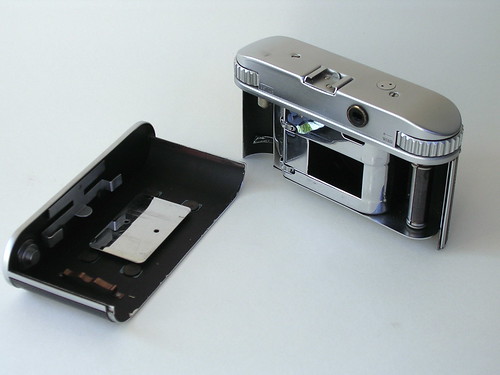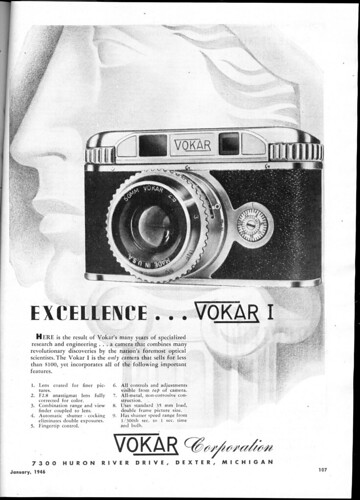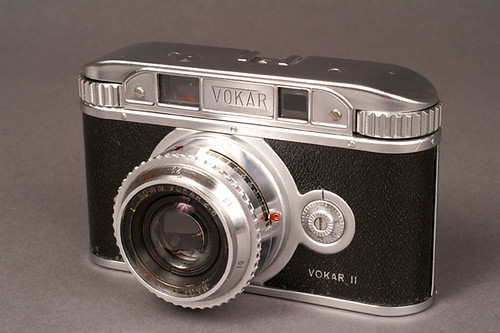Difference between revisions of "Vokar I"
Hanskerensky (talk | contribs) (Added link to user manual page) |
Hanskerensky (talk | contribs) (Added link to review) |
||
| (One intermediate revision by the same user not shown) | |||
| Line 1: | Line 1: | ||
| − | |||
The '''Vokar I''' camera had been designed by Richard Bills before WWII<ref> Lahue, Kalton C. and Bailey, Joseph A. ''Glass, brass, & chrome: the American 35mm miniature camera''; University of Oklahoma Press, 2001. pgs. 284-285</ref>, and allegedly the [[Vokar|Electronic Products Manufacturing Co.]] invested $250,000 in its development<ref>Lahue, Kalton C. and Bailey, Joseph A. ''Collecting Vintage Cameras Volume 1: The American 35mm''. American Photographic Book Publishing Co., 1972. pg.154</ref>. But during wartime, the company had diverted its resources into making bomb-fuse components<ref>[http://www.flickr.com/photos/camerawiki/5506497426/in/pool-camerawiki "Trade Notes and News"] ''Popular Photography'' (US magazine), January 1946, pg. 64.</ref>, delaying the camera's manufacture. | The '''Vokar I''' camera had been designed by Richard Bills before WWII<ref> Lahue, Kalton C. and Bailey, Joseph A. ''Glass, brass, & chrome: the American 35mm miniature camera''; University of Oklahoma Press, 2001. pgs. 284-285</ref>, and allegedly the [[Vokar|Electronic Products Manufacturing Co.]] invested $250,000 in its development<ref>Lahue, Kalton C. and Bailey, Joseph A. ''Collecting Vintage Cameras Volume 1: The American 35mm''. American Photographic Book Publishing Co., 1972. pg.154</ref>. But during wartime, the company had diverted its resources into making bomb-fuse components<ref>[http://www.flickr.com/photos/camerawiki/5506497426/in/pool-camerawiki "Trade Notes and News"] ''Popular Photography'' (US magazine), January 1946, pg. 64.</ref>, delaying the camera's manufacture. | ||
| Line 9: | Line 8: | ||
However the small Vokar Corporation failed to make much of a dent in the US camera market. Advertising became spotty after the initial launch; and the camera may have suffered from poor distribution. Sales were poor, and the Vokar rangefinder disappeared rather quickly, making it a bit of a rarity today. | However the small Vokar Corporation failed to make much of a dent in the US camera market. Advertising became spotty after the initial launch; and the camera may have suffered from poor distribution. Sales were poor, and the Vokar rangefinder disappeared rather quickly, making it a bit of a rarity today. | ||
| − | |||
{{Flickr_image | {{Flickr_image | ||
| Line 28: | Line 26: | ||
}} | }} | ||
{{br}} | {{br}} | ||
| − | |||
{{Flickr_image | {{Flickr_image | ||
| Line 53: | Line 50: | ||
==Links== | ==Links== | ||
*[https://www.butkus.org/chinon/vokar/vokar_i/vokar_i.htm Vokar I user manual] at [https://www.butkus.org/chinon/ Butkus.org] | *[https://www.butkus.org/chinon/vokar/vokar_i/vokar_i.htm Vokar I user manual] at [https://www.butkus.org/chinon/ Butkus.org] | ||
| + | *[https://mikeeckman.com/2019/07/vokar-ii-1947/ Vokar II review] at [https://mikeeckman.com/ Mike Eckman Dot Com] | ||
| − | [[Category:USA]] [[Category:35mm rangefinder]] [[Category:Vokar]] [[Category:V]] | + | [[Category:USA]] |
| + | [[Category:35mm rangefinder]] | ||
| + | [[Category:Vokar]] | ||
| + | [[Category:V]] | ||
| + | [[Category:1946]] | ||
Latest revision as of 05:24, 19 December 2023
The Vokar I camera had been designed by Richard Bills before WWII[1], and allegedly the Electronic Products Manufacturing Co. invested $250,000 in its development[2]. But during wartime, the company had diverted its resources into making bomb-fuse components[3], delaying the camera's manufacture.
In late 1945 the company renamed itself "Vokar" (after its existing line of photo products)[4]. The Vokar I camera was first advertised in January, 1946 photography magazines[5], disappeared for several months, and then finally resurfaced in the fall of 1946 at a price of $76.70[6].
The camera's sleek styling owed nothing to the boxy Argus C3 manufactured just 8 miles away; and for the era, its specification was quite ambitious. It offered single-eyepiece framing and rangefinder focus; shutter cocking coupled to the film advance; an f/2.8 lens (at a time when f/3.5 or f/4.5 were standard); and a full range of shutter speeds from 1 to 1/300 sec.
By 1948, the Vokar II camera appeared. The mechanical differences were extremely minor; and otherwise the appearance and specs of the camera were unchanged. The name "Vokar II" appears printed onto the front leatherette below the exposure-counter dial.
However the small Vokar Corporation failed to make much of a dent in the US camera market. Advertising became spotty after the initial launch; and the camera may have suffered from poor distribution. Sales were poor, and the Vokar rangefinder disappeared rather quickly, making it a bit of a rarity today.

|
| Vokar I image by Rick Oleson (Image rights) |

|
| Back of Vokar I; showing oddly chromed internal parts image by Rick Oleson (Image rights) |

|
| Earliest advertisement, January 1946 scanned by Voxphoto (Image rights) |

|
| Vokar II image by J. Adrian Wylie (Image rights) |
Notes
- ↑ Lahue, Kalton C. and Bailey, Joseph A. Glass, brass, & chrome: the American 35mm miniature camera; University of Oklahoma Press, 2001. pgs. 284-285
- ↑ Lahue, Kalton C. and Bailey, Joseph A. Collecting Vintage Cameras Volume 1: The American 35mm. American Photographic Book Publishing Co., 1972. pg.154
- ↑ "Trade Notes and News" Popular Photography (US magazine), January 1946, pg. 64.
- ↑ "Available Now: The New Vokar Streamlined Projector" (advertisement) Popular Photography (US magazine), December 1945, pg. 137.
- ↑ "Excellence… Vokar I" (advertisement) Popular Photography (US magazine), January 1946, pg. 107.
- ↑ "Finest… Vokar I" (advertisement) Popular Photography (US magazine), November 1946, pg. 12